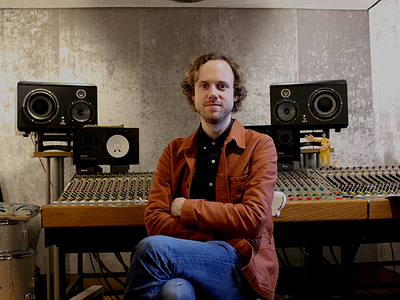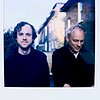Part 1
Name: Jim Wallis
Nationality: British
Occupation: musician/producer
Current Release: Pool with Nick Goss on Tip Top Recordings
Recommendations: Jack from Modern Nature turned me on to the band Heron and their self-titled album a couple of years ago and it's something I can't believe isn't more well-known. Beautiful early 70s English folk, recorded outside! /Matthew Reed’s short film Village Hours, shot in village halls around Essex and Suffolk.~
If you enjoyed this interview with Jim Wallis, you can learn more about him at www.jimwallismusic.com
When did you start writing/producing music - and what or who were your early passions and influences? What was it about music and/or sound that drew you to it?
Growing up in the 90s with two older siblings, Britpop was an inevitable part of my musical upbringing. I had posters of Oasis, Manic Street Preachers, Catatonia and, yes, Menswear on my bedroom wall and I remember being very excited when my sister got me John Power from Cast's autograph at Glastonbury one year. "Nice one, Jim - John Power", it said.
I started to learn the piano when I was 7 and then the drums and guitar a few years after that. A big turning point for me was when I discovered recording software in my teens. I was immediately captivated by the process of being able to layer different instruments and sounds by myself and I suppose I still am. I love to make music with other people, but there is something magical about being able to build an entire piece of music on my own...to be able to express the ideas in my head directly without having to describe them for someone else to translate.
For most artists, originality is preceded by a phase of learning and, often, emulating others. What was this like for you: How would you describe your own development as an artist and the transition towards your own voice?
I absolutely went through that period of emulation as a teenager. Radiohead were a huge obsession for me and I remember one song in particular I made when I was 17 which was essentially my attempt to recreate Everything In Its Right Place with a basic midi emulation of an electric piano and some primitive drum programming.
I don't necessarily see it as a linear progression though. As I've discovered different genres of music throughout my life, I think elements of emulation and homage are an inevitable part of that process. Hearing a piece of music that inspires me to create something of my own is always an exciting feeling and something I hope I'll never lose. I guess the hope is that as you continue to draw from a wider and wider pool of references, particular influences become less apparent and blend together into something of your own.
How do you feel your sense of identity influences your creativity?
Most of my musical work is either as a producer for other artists or as a session musician, so this is something I often think about. In both of those situations, the ultimate goal is to serve someone else's vision of how they want to present themselves artistically, which often requires removing some of my own identity and ego from proceedings. At the same time, they've generally chosen to work with me for a reason, so it doesn't make sense to become completely anonymous. It's always a question of finding the right balance in terms of how much of myself to bring to a particular project.
What were your main creative challenges in the beginning and how have they changed over time?
On a simple level, I've always been driven by the feeling of just wanting to be better at what I do. When I was growing up, I was writing songs and wanted to be able to sing them, but I wasn't a natural singer. So, I worked at that over a period of years until a point where I felt confident enough to share that music with the world and to be able to go out and sing in public. I still feel that impulse now...I always feel driven to be a better engineer, a better writer, a better drummer. That's part of the motivation that keeps me making music, I think.
As creative goals and technical abilities change, so does the need for different tools of expression, be it instruments, software tools or recording equipment. Can you describe this path for you, starting from your first studio/first instrument? What motivated some of the choices you made in terms of instruments/tools/equipment over the years?
From a young age, I was naturally drawn to the idea of being able to play several instruments. That's something that's stayed with me and I'm always on the hunt for new sounds. In the last year or so I've bought a harmonium and an autoharp, for instance.
There are times though when I'm struggling to play something that's in my head and I'll berate myself for not having stuck with one instrument and really mastered it. I was recording with someone recently, struggling to nail a drum part, and I yelled 'Why don't I practise more!' at the end of a take. Ultimately though, I love being able to choose from a wide variety of options when it comes to creating a piece of music of my own or adding to someone else's and I wouldn't want to trade that.
Have there been technologies or instruments which have profoundly changed or even questioned the way you make music?
One of the main developments in my own music over the last few years has been learning to play the cello. My grandma was a great cellist and, after she died in 2012, her beautiful old cello sat unplayed in my parents house until one Christmas I decided to dust it off and bring it back to London with me. Playing a bowed instrument was something completely new for me and after struggling through a few Youtube tutorials I ended up finding a local teacher and taking lessons. It was a really rewarding experience to start something like that from scratch. I'd finish my lesson each week and a 7-year-old would arrive after me with their mum.
Being able to play the cello has had a big impact on my solo work, as you can hear on Pool. It opened up a new world and inspired me to start making instrumental music, which I'm not sure I would have done without it.
Collaborations can take on many forms. What role do they play in your approach and what are your preferred ways of engaging with other creatives through, for example, file sharing, jamming or just talking about ideas?
Collaboration is a big part of my musical life. I think one of things that made this collaboration with Nick so enjoyable is that we each had quite clear roles in the process. Nick's involvement kind of bookended the whole thing I suppose. He made the field recordings that run throughout the album while on an artist residency on board the Cielo Di Gaeta tanker in the Adriatic Sea and then sent them to me along with a selection of guitar loops he'd recorded during lockdown. They were some amazing raw ingredients to work with. Nick then gave me pretty free rein to map out the album, arranging what he'd sent me and writing pieces for piano, strings and synths to go alongside them, sending things back and forth for his feedback. Then we got together in the studio, recorded some more of Nick's guitar and together we shaped what we'd come up with and pushed it further. It felt like a very natural collaboration, in that we weren't trying to occupy the same space or treading on each other's toes.






